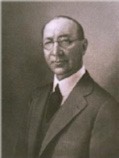Bill’s Family - Person Sheet
Bill’s Family - Person Sheet
Misc. Notes
Howard Hughes Sr., commonly known as Big Howard, was a graduate of the Harvard School of Law, yet never once appeared before a court of law. Big Howard spent the first 36 years of his life chasing money across the Texas plains, as a wildcatter and a speculator in oil leases, working hard enough and earning just enough to move on to another, hopefully more fortunate gamble. In the year of his marriage, Big Howard sold leases on land that proved to have $50,000 in oil beneath it. He promptly took his new wife to Europe for a honeymoon, and returned exactly $50,000 poorer.
In 1908, Big Howard turned his ingenuity and his hobby to tinker into good fortune. Current drilling technology was unable to penetrate the thick rock of southwest Texas, and oilmen could only extract the surface layers of oil, unable to tap the vast resources that laid far below. Big Howard came up with the idea for a rolling bit, with 166 cutting edges and invented a method to keep the bit lubricated as it tore away at the rock. Later that year, Big Howard produced a model and went into business with his leasing partner, Walter B. Sharp, forming the Sharp-Hughes Tool Company.
Rather than sell the bits to oil drillers, Hughes and Sharp decided to lease the bits out on a job basis, for the tidy sum of $30,000 per well. With no competitor able to duplicate this new technology, Sharp-Hughes Tool possessed a profitable monopoly over oil extraction. So quickly was the invention successful that in late 1908, the partners built a factory on a seventy acre site east of Houston. In 1915, Sharp passed away and Big Howard purchased his shares in the corporation, thus becoming the sole owner.
Cash flowed freely into and back out of Sharp-Hughes Tool. Big Howard became a first class socialite, and began to spend increasing amounts of time and money on parties, automobile racing and travel. One of his amusements was to charter a railroad car, fill it with friends, and conduct a rolling party between Texas and California. In the spring of 1921, Mrs. Hughes past away, and Big Howard re-located to Hollywood, where he gave more parties, lavish even by movie star standards. Three years later, in January of 1924, Big Howard died as abruptly as his wife, willing his three-fourths of his estate to his only son, Howard Robard Hughes. Big Howard left an estate appraised for tax purposes at $871,518. As a less attractive part of his legacy, he left behind $258,000 in unpaid bills, including $2,758 to Brook Brothers Clothiers, $5,502 to Cartier's in New York, and $3,500for a grand piano.302
In 1908, Big Howard turned his ingenuity and his hobby to tinker into good fortune. Current drilling technology was unable to penetrate the thick rock of southwest Texas, and oilmen could only extract the surface layers of oil, unable to tap the vast resources that laid far below. Big Howard came up with the idea for a rolling bit, with 166 cutting edges and invented a method to keep the bit lubricated as it tore away at the rock. Later that year, Big Howard produced a model and went into business with his leasing partner, Walter B. Sharp, forming the Sharp-Hughes Tool Company.
Rather than sell the bits to oil drillers, Hughes and Sharp decided to lease the bits out on a job basis, for the tidy sum of $30,000 per well. With no competitor able to duplicate this new technology, Sharp-Hughes Tool possessed a profitable monopoly over oil extraction. So quickly was the invention successful that in late 1908, the partners built a factory on a seventy acre site east of Houston. In 1915, Sharp passed away and Big Howard purchased his shares in the corporation, thus becoming the sole owner.
Cash flowed freely into and back out of Sharp-Hughes Tool. Big Howard became a first class socialite, and began to spend increasing amounts of time and money on parties, automobile racing and travel. One of his amusements was to charter a railroad car, fill it with friends, and conduct a rolling party between Texas and California. In the spring of 1921, Mrs. Hughes past away, and Big Howard re-located to Hollywood, where he gave more parties, lavish even by movie star standards. Three years later, in January of 1924, Big Howard died as abruptly as his wife, willing his three-fourths of his estate to his only son, Howard Robard Hughes. Big Howard left an estate appraised for tax purposes at $871,518. As a less attractive part of his legacy, he left behind $258,000 in unpaid bills, including $2,758 to Brook Brothers Clothiers, $5,502 to Cartier's in New York, and $3,500for a grand piano.302
Spouses
1Allene Stone Gano  , 5C1R, G500, 3401, F
, 5C1R, G500, 3401, F
 , 5C1R, G500, 3401, F
, 5C1R, G500, 3401, FFatherWilliam Beriah Gano , 3399, M (<1860->1911)
MotherJeanette DeLafayette "Nettie" Grissom , 3400, F (<1860->1911)
Marriage24 May 1904, Dallas, TX, US
ChildrenHoward Robard , 3403, M (1906-1976)


